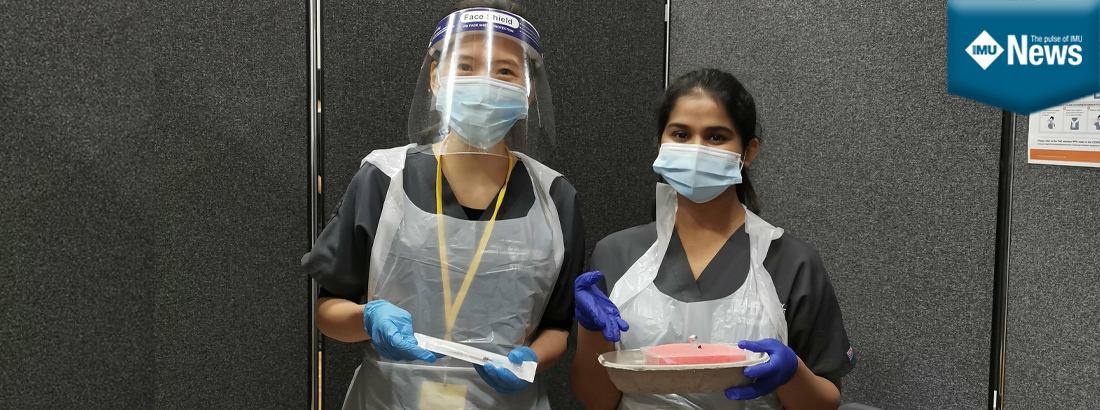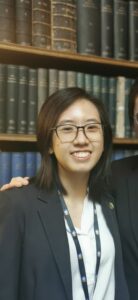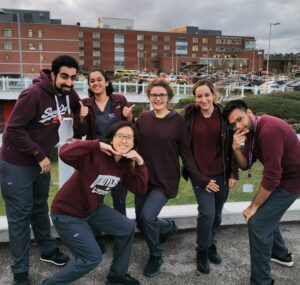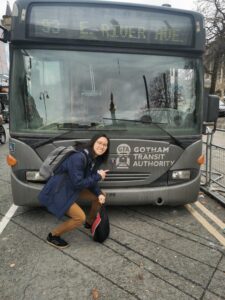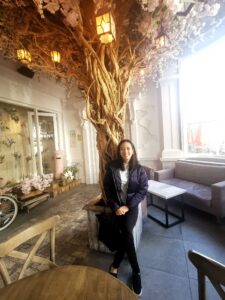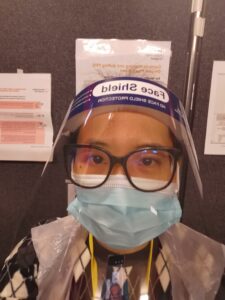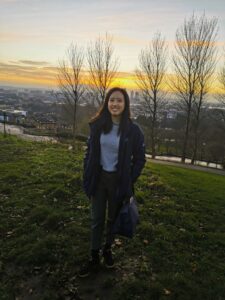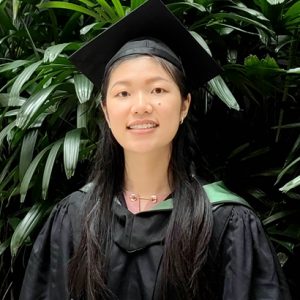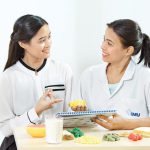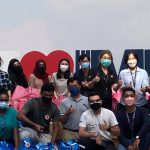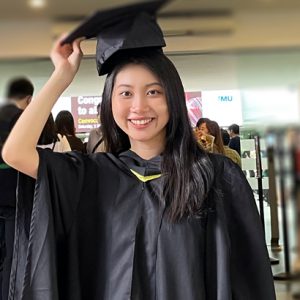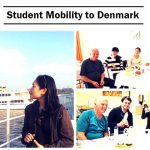Ang Ai Lyn, Juliana started her medical studies at the International Medical University (IMU), Malaysia. She started studying the first 2.5 years of her studies in Malaysia and continued the clinical years of her medical degree at the University of Liverpool, UK. Juliana, a 4th year medical student, tells us more of her time in Liverpool and experience as a vaccinator in the UK. “Liverpool is one of the friendliest cities in the UK and has been very welcoming from the very first time I arrived here. What I really like about studying medicine in Liverpool is that for our clinical placement learning, there are many different hospitals and clinics for us to learn from. Being in different healthcare settings in different areas of Liverpool allows us to understand the slightly different health needs of different patient groups. This varied perspective is just as important as uniformed clinical knowledge.
When the pandemic first hit hard in March 2020, we were initially told that we had a 4-week break from placements. I remember arriving back in Malaysia a day before the first Movement Control Order (MCO) was announced by Malaysian PM, YBhg Tan Sri Dato’ Haji Muhyiddin bin Haji Muhammad Yassin. It was a bizarre time for everyone.
It was even more bizarre when the University then subsequently told us that placements would not resume for the remaining academic year and that we would be supplemented with online learning. The UK’s healthcare service was overwhelmed, and with us (medical students) being there, unnecessary pressure would be placed on the healthcare staff, so online learning was the only option at that time.This sudden change from placement learning to online learning did impact me. I never truly appreciated the patient contact on placements until this pandemic hit.
With these new challenges and barriers to our medical education, doctors across the UK saw a need for a shift in medical education. The concept of Free Open Access Medical Education (FOAMed) was fully realised, medical education changed for the better. Despite the lack of patient contact, I found myself consolidating medical knowledge in a different way and making full use of the many online medical learning platforms available to medical students. While there are many advantages to online learning, it is not a substitute for our medical education, but it plays a supplementary role in our placement learning.
In August 2020, after 5 months of online learning, we were called back to return to placement learning. The UK healthcare system had gradually recovered and was better prepared for what is to come, I was back in Liverpool to resume my 4th Year as a medical student. In December 2020, the opportunity to help with the rollout of Covid-19 vaccinations came. This was during our Christmas break, and as I could not travel home and meet my family for Christmas, I offered to help. Clinical year medical students in Liverpool have the option to take additional hours outside of our placement hours to support the vaccine rollout. I continue to help outside of my placement hours, whenever I have the time. It is so essential to get a large percentage of the population vaccinated, and this can only happen when we all work together. Overall, helping with the Covid-19 vaccinations has been a fulfilling experience, with some of the elderly patients even sharing their stories about the community centre with me.
Prior to working as vaccinators, we had to complete mandatory online training and assessment about the vaccines. When we are working, we work under the supervision of General Practitioners (GPs). They oversee the medical aspect of the vaccinations. There will always be a Practice Manager overseeing the logistics side of the vaccinations. Pharmacists are responsible for reconstituting the vaccines and for keeping track of the duration of time the vials have been out. It is so important for all of us to work together in this endeavour. As vaccinators, we work in pairs, one would deliver the vaccine whilst the other would do the administrative work. We have to ask screening questions to patients and keep the patient informed of what we are doing. Patients are usually happy to receive the vaccine.
As for patients who are hesitant, we take the time to understand where they are coming from and we ask that the GP explain to the patients and to clarify their doubts and queries. It is through that, that we can debunk misinformation and gain the trust from patients, not through condemnation. At the end of the day, misinformation is rife, and with heightened anxiety in society, an individual’s opinions and views can very easily sway. Judgement and condemnation would not alleviate fears and could even create more mistrust amongst communities. After the vaccine is administered, we always advise that patients continue to look after themselves (wearing masks, social distancing etc.) as one dose of vaccine does not give protection until a few days later and even then, it doesn’t give full protection.
| Have you been vaccinated? |
|---|
| I received my Covid-19 vaccination as medical students are considered frontliners in the UK. I have received 2 doses of the Pfizer vaccine, 21 days apart. Apart from a sore arm and slightly worse flu-like symptoms after my second dose, I feel completely well. It is very common to have a sore arm at injection site and flu-like symptoms for 1-3 days. These are well-documented side effects indicating that your body is mounting an immune response. This is what is expected from the vaccine, and that means that the vaccine is doing its job in giving a level of protection. Of course, different individuals will experience different severity of side effects. Having received the vaccine and having administered the vaccine, I have been impressed with the safe storage and transportation of the vaccines. This is critical in ensuring that vaccines are effective and safe to patients. The logistics of the vaccination sites were also managed very well. The one-way system was used to minimise patients crowding in an area and to minimise close contact between each other. Patients would enter through one door, remain in a waiting area (socially distanced), and leave through a separate door. Everyone working on the vaccination programme are very clear on what their roles are, and we communicate effectively with each other to ensure that patients receive the vaccine safely. Pharmacists would draw up the vials, administrators would ask screening questions, vaccinators would administer the vaccine and give further advice and guidance, doctors would be on site to oversee and monitor patients to make sure everyone has received their vaccines safely. In the UK, this has given the public a peace of mind as they know that the vaccination programme is well-organised. |
| What is your opinion of the role of vaccinations in reducing the number of infections? |
|---|
| Since the vaccination rollout, there has been a sense of hope and joy in the community. Healthcare workers and volunteers involved in the vaccine roll out continue to work in full force. The Covid-19 vaccinations are going according to priority groups. Most of the elderly population and healthcare workers have been vaccinated. 2 months ago, it was not yet known if the vaccine would prevent a vaccinated person from carrying and spreading the virus. The working assumption was that there was still a possibility for vaccinated individuals to be silent carriers, and until most of the population is vaccinated, we would still need to continue with the preventive measures. What we knew at that time was that the Covid-19 vaccines would give us a higher level of immune protection and reduce our risk of developing serious complications from Covid-19. There was no sufficient data to demonstrate reduced transmission at that time. However, a few weeks ago, ongoing surveillance and preliminary data suggested that the vaccine has helped reduce transmission rates. The scientific data continues to guide our response to the pandemic. |
Juliana is scheduled to graduate with her medical degree in July 2022. She plans to work in England as a foundation doctor (equivalent to 2 years of Housemanship in Malaysia). Her future plan is to be a compassionate and ethical doctor. She would like to come back to Malaysia and contribute to Malaysia’s healthcare in the future. For now, she is focussed on learning as much as she can in the UK. Circumstances are always changing. Juliana’s future plans are fluid and subject to change as time goes by. In whichever country she resides in, what is important to her is being of service to the community, especially the underserved and marginalised communities.




